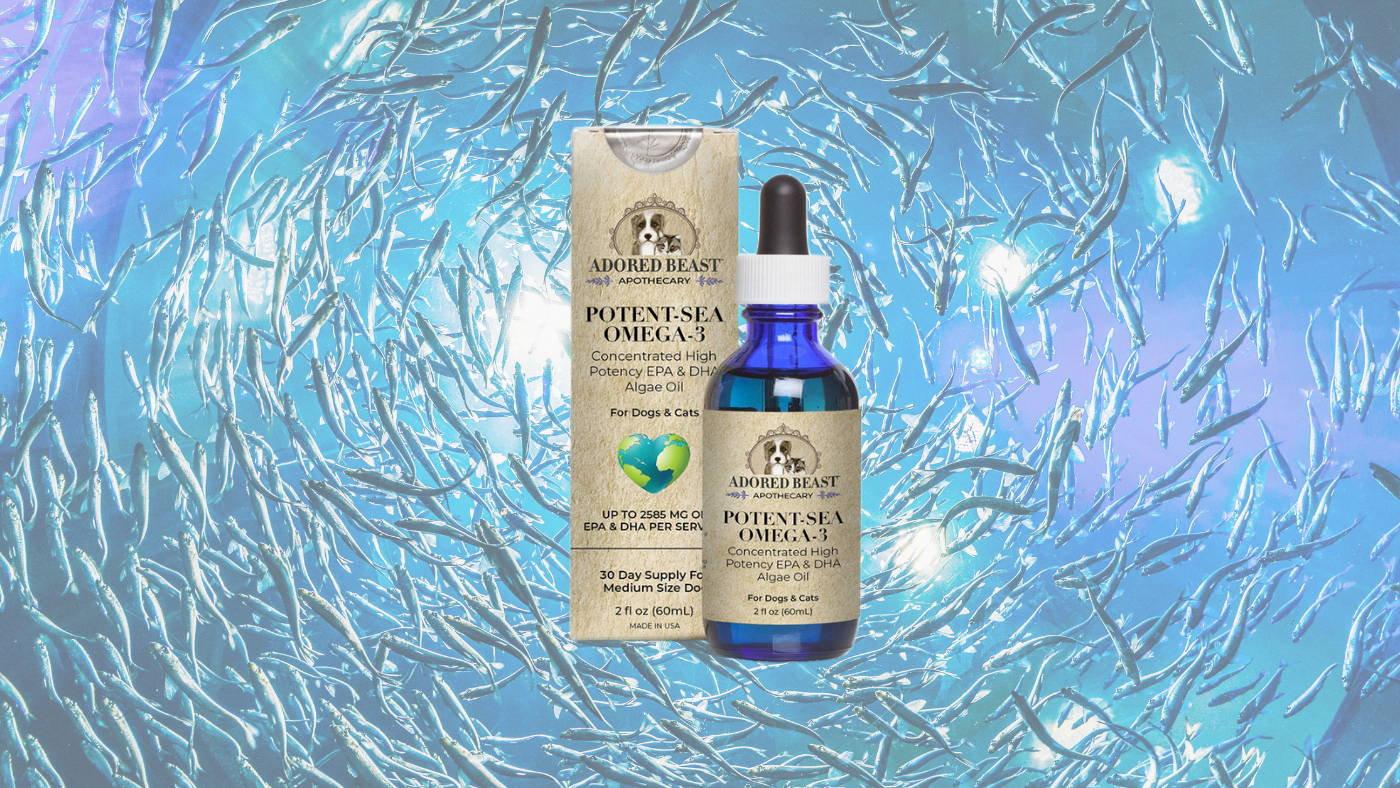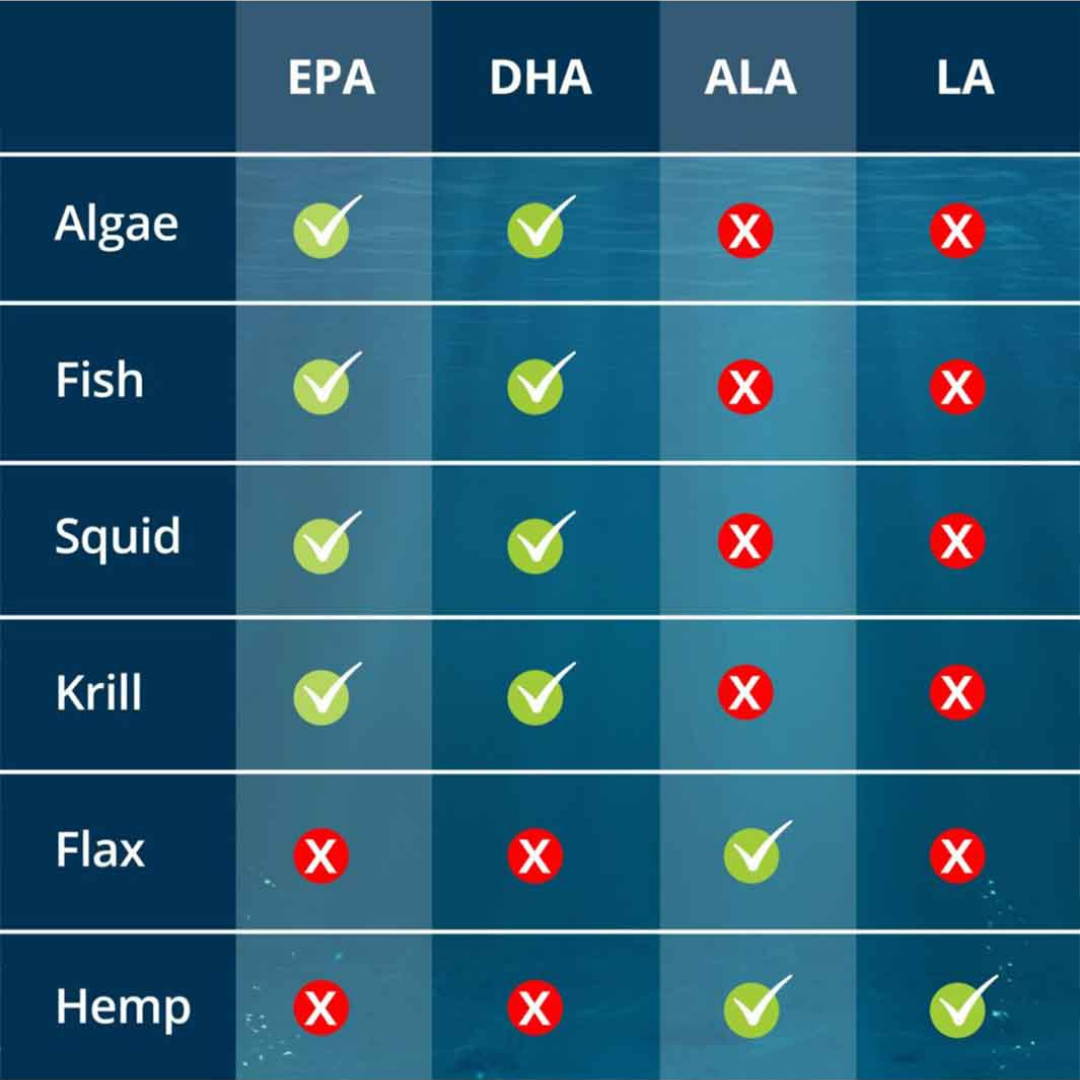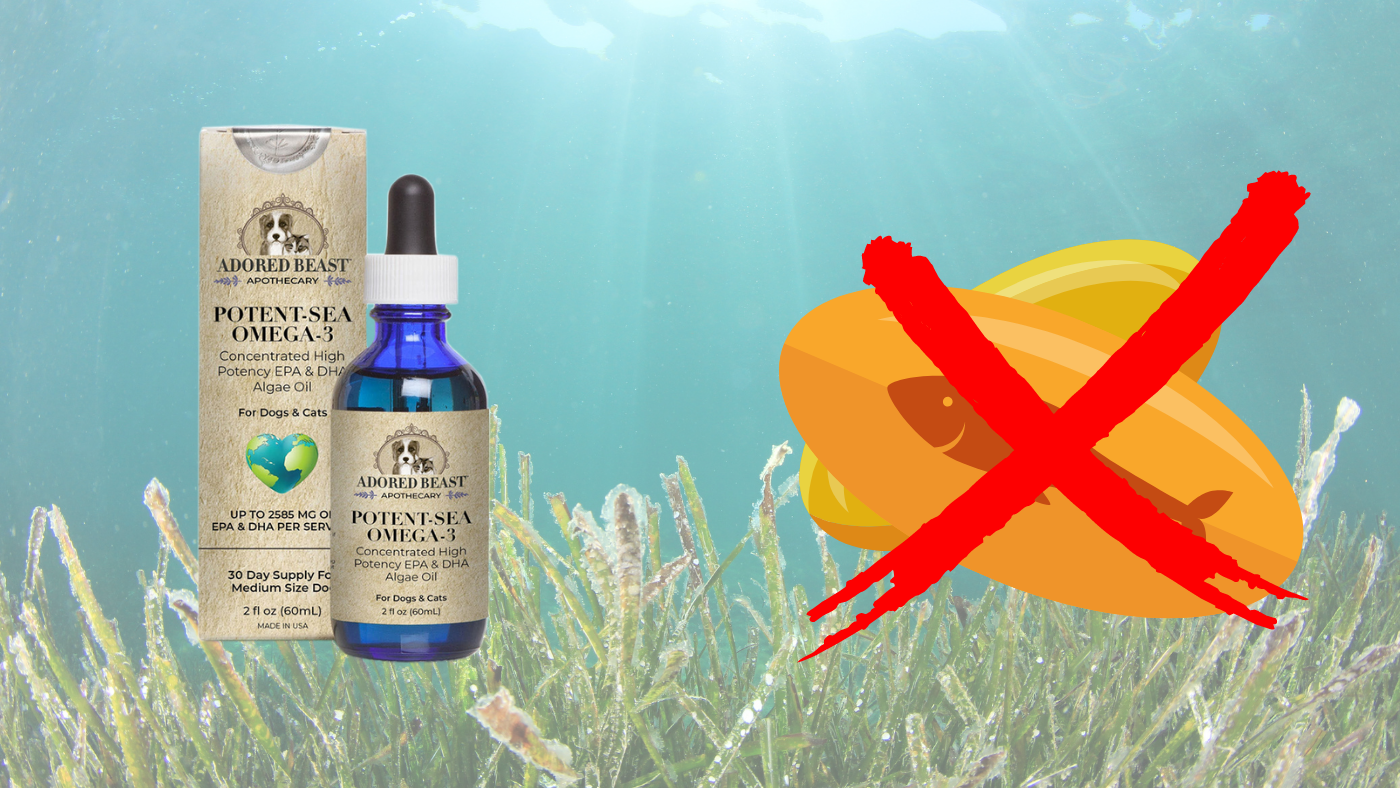
OMEGA-3 - YEAY! Fish oil - NAY!
Omega-3 fatty acids contain powerful health benefits for our dogs and cats and have been shown to be incredibly important for pet health and their longevity.
Omega-3 fatty acids help to support joint, brain, heart, eye, and skin health. It has also been found to help reduce inflammation, support the immune system, increase the ability to fight cancer, and so much more.
To put it plain and simple, your pet should really be getting a good, fresh source of Omega-3 in their diet. But before we get carried away and go on a hunt for omega-3 for our pets, hold on! You might be surprised to hear that fish oil is NOT the best source of omega-3 for cats and dogs. In fact, we don’t recommend fish oil for dogs and cats at all. There are far better and safer alternatives for your pets!
In this blog post, I’m going to tell you exactly what to look out for when buying omega-3 supplements for your pets.
Table of contents
- What are Omega-3 Fatty Acids?
- Benefits of Omega-3 for Dogs and Cats
- Is Fish Oil Safe for Dogs and Cats?
- Best Omega-3 Sources for Dogs and Cats
- Conclusion
What are Omega-3 Fatty Acids?
Omega-3 fatty acids are polyunsaturated fats that have been deemed essential because our pets do not produce these fatty acids on their own. The only way for our cats and dogs to get Omega-3 is if they are consumed, which is why Omega-3 fatty acids play such a vital role in pet nutrition.
omega-3 VERSUS omega-6 fatty acids
The two primary groups of fatty acids are omega-3 and omega-6 fatty acids.
Omega-3 fatty acids are anti-inflammatory, while Omega-6 fatty acids are pro-inflammatory.
For optimum health, our pet's diet should contain an Omega-6 to Omega-3 ratio of between 5:1 to 10:1. However, some commercial pet foods can have ratios as high as 40:1.
Pets who consume pet food high in omega-6 are at higher risk to develop chronic inflammatory diseases such as:
-
Allergies
-
Alzheimer's
-
Arthritis
-
Cancer
-
Diabetes
-
Obesity
-
Heart Disease
Pet Foods High in Omega-6 Fatty Acids
Unfortunately, most pets consume pet food that is too high in omega-6 and therefore requires the addition of omega-3, to help balance the essential fatty acid ratio.
One of the major reasons omega-6 is so high in pet food is due to the fact that many pet foods are grain-based and legume-based. Even grain-free pet food and prescription pet food are affected.
Commercial raw diets can also have poor Omega 6 to 3 ratios due to poor quality meat, or grain-fed meat. For example, if a cow or a cage-free chicken consumes a diet high in (GMO) grains, the meat of those animals will contain higher levels of omega-6.
Fun fact: Raw diets made from pasture-raised poultry and ruminants are naturally higher in Omega-3s.
To help balance the fat ratio, many pet food manufacturers add omega-3 as an ingredient, but there is a big health concern when it comes to omega 3 oils and supplements. We will talk more about omega-3 supplements later, because there are Dos and Don’ts that you should know about…
The 3 Main Types of Omega-3
There are many different types of omega fatty acids, and here is where it can become confusing. There are omega 3’s, 6’s, 7’s, and 9’s, and they all contain important properties and roles for the body.
Alpha-linolenic Acid (ALA), Eicosapentaenoic Acid (EPA), and Docosahexaenoic Acid (DHA) are the 3 main types of omega-3.
ALA is a short-chain omega-3 fatty acid that is commonly found in plants and is an essential precursor of EPA or DHA. However, for our pets, only a small percentage of ALA is converted to EPA or DHA. ALA can be found in plants such as kale or spinach and in nuts, seeds, and oils such as flax, chia, and hemp seeds.
EPA & DHA are long-chain omega-3 polyunsaturated fatty acids that are abundant in fish, shellfish, and some algae plants. EPA has anti-inflammatory properties and supports the immune response of dogs and cats. DHA helps to support eye, brain, heart, and nervous system health.
Benefits of Omega-3 for Dogs and Cats
Omega-3 fatty acids are known for their anti-inflammatory properties and have been found to be useful in the management of inflammatory and autoimmune diseases. (1)
Omega-3 has also been found to be helpful in:
-
Reducing anxiety (2)
-
Supporting Eye health (3)
-
Supporting brain health (4)
-
Supporting heart health (5)
-
Helping to fight and lower inflammation (6)
-
Helping to fight autoimmune diseases (7)
-
Helping to fight cognitive decline and Alzheimer's Disease (8)
-
Helping to prevent cancer (9,10)
-
Helping to improve bone and joint health (11)
-
Helping to improve skin health and skin concerns (12)
What Happens If Your Dog or Cat Doesn’t Get Enough EPA or DHA?
A deficiency of EPA and DHA in dogs and cats can lead to:
-
Irritated, itchy, and dry skin and coat
-
Depression and anxiety
-
Joint pain and stiffness
-
Allergies
-
Hair loss
-
Hot Spots
So by now, I’m sure it’s pretty clear your dogs and cats need a good source of omega-3 in their diet.
So What About Fish Oil? Is Fish Oil Good for Dogs and Cats?
While fish oil contains high levels of EPA & DHA, there are a few problems with fish oil. We generally do not recommend feeding fish oil, which is why we’ve never offered fish oil at PAWDEGA. Let's talk about the reasoning behind this decision.
Fish Oil can be toxic
Sadly, our oceans are contaminated with heavy metals, and unfortunately, the fish that are used to make fish oil can be contaminated as well. Large fish species are more likely to be contaminated with heavy metals and toxins, compared to small fish species.
Fish can accumulate various heavy metals such as lead, mercury, arsenic, and cadmium. These heavy metals often end up in the fish oil derived from fish.
Heavy metal toxicity in dogs and cats can lead to health problems affecting the nervous system, GI tract, immunity, as well as the lungs, kidneys, skin, and eyes.
Most salmon oil (especially from Canada and Norway) comes from farmed salmon. Farmed Salmon has been deemed the most toxic food on the planet due to their living conditions and feed. (13)
Here’s a tip on the side: If you feed a pet food that contains fish or fish oils, we highly recommend regularly doing a heavy metal detox to help offset any negative impact. Including zeolite into your pet’s diet can help in the removal of heavy metals. (14)
Fish Oil Supplements are an Environmental Hazard
Fish oil is not environmentally friendly or sustainable.
The negative environmental impact of industrial fishing has been analyzed and it has been found to be damaging to the world’s marine ecosystems. Our oceans are being overfished, fishing gear is polluting our oceans, and mammals like whales, tortoises, and dolphins get caught in fishing nets.
If you're environmentally conscious and want to contribute to a healthy ocean, then it's best to stay away from fish oil.
Fish Oil Oxidation CAN CAUSE SIDE EFFECTS
Fish oil easily turns rancid and consuming rancid oil has been linked with organ damage and atherosclerosis. (15)
Fish oil oxidizes as soon as it’s exposed to air, light, or freezing. More research shows that oxidized fatty acids have a pro-inflammatory and mutagenic effect on the body. (16)
Oxidation in the body can contribute to free radicals which can cause cellular damage and chronic inflammation. The imbalance has been shown to accelerate the aging process and have an increased risk of having certain cancers and other health conditions. (17)
To determine if an omega-3 supplement is rancid, open the capsule to smell the oil inside. Truly fresh fish oil will have no fishy taste or smell, just like fresh fish.
It’s important to note that it is very difficult to stop fish oil from oxidizing and in some cases a bottle of fish oil may have turned rancid before you ever open the bottle.
We believe the risk of feeding rancid fish oil is way too high, so we recommend staying away from fish oil supplements, and pet foods that contain any type of fish or salmon oil.
Best Omega-3 Sources for Dogs & Cats
At this point you might be thinking that nuts and seeds are the answer to meeting your pet’s Omega-3 requirements, but the truth is most plant-based omega-3s do not possess high levels of DHA or EPA which are highly beneficial to our pets.
Alternating between different omega-3 sources is a really great idea, so below are 3 natural omega-3 sources that you can alternate on a daily or weekly basis to provide your pet with comprehensive omega-3 nutrition.
Potent-Sea - Algae Oil (Algae Grown on Land)
Algae oil is the best option when it comes to providing a non-toxic, effective, sustainable, and potent omega-3 supplement.
Algae oil contains a rich source of omega-3 fatty acids (EPA & DHA) and more importantly, it does not harm the oceans and our planet. Micro-algae is known for its high DHA and EPA content and provides omega-3 fatty acids as well as other beneficial compounds that support the health of the entire body of our pets. Micro-algae is nature’s original source of omega-3, that’s where the fish get it from too!
Potent-Sea is jam-packed with EPA & DHA and even contains more EPA & DHA than fish oil. Let’s have a look at the diagram below. Potent-Sea provides a whopping 1293mg of EPA & DHA in a single serving for a 23kg dog compared to 1170mg of fish oil which as we already mentioned is very likely to be toxic or go rancid before you open the bottle or shortly after opening the bottle.
Fun Fact: A single Green Lipped Mussel contains 9-28mg of EPA & DHA, you would need to feed at least 45 Green Lipped Mussels to a 23kg dog to reach the EPA & DHA levels in Potent-Sea. We do not recommend feeding your dog 45 green-lipped mussels in a single day.

Here are our tips for choosing the best algae oil for your pet:
Choose an algae oil where the micro-algae have been grown on land because it protects the ocean and our planet. Make sure it’s third-party tested to ensure the oil is free from solvents, pesticides, or heavy metals.
Raw, Wild-Caught, Small Oily Fish
When feeding raw fish to your cat and dog, it is important to freeze the fish for 3 weeks in order to kill any potential parasites.
It’s recommended to stick to small oily fish such as sprats, mackerel, sardines, herring, or sea bass because heavy metal contamination will be larger in bigger fish. Make sure you opt for wild-caught fish as farmed fish has been deemed as one of the most toxic foods on the planet due the feed the fish consume and their poor living conditions.
We’ve got conveniently ready-frozen whole wild-caught fish and ground wild-caught fish available for you.
Hemp Seed Oil for omega-3
Hemp seed oil is a plant source of Omega-3, 6, and 9 fatty acids and great nutritional oil. It contains ALA, GLA, and LA, as well as minerals. It is important to note that hemp seed oil does not contain the important EPA and DHA components, so it should be rotated with raw fish and algae oil.

Conclusion
Omega-3 is considered to be an essential addition to our pet's diet because dogs and cats are not able to produce Omega-3 on their own. Omega-3 fatty acids help to support joint, brain, heart, eye, and skin health. It has also been found to help reduce inflammation, support the immune system, increase the ability to fight cancer, and so much more thanks to the EPA & DHA.
But not all omega-3 is safe and some Omega-3 supplements can actually cause health concerns in our pets. Fish oil is known for its high levels of EPA and DHA but can have negative impacts on the health of our pets. Fish oil has been found to quickly turn rancid and oxidize as soon as it’s exposed to light, heat, air, or freezing which can cause premature aging and inflammatory conditions.
The best, safe, and non-toxic alternative to fish oil is algae oil.Algae oil has a higher Omega-3 content, is environmentally friendly, and does not cause oxidative damage in the body. It’s an excellent source of Omega-3 for cats and dogs.
Additionally, to provide your pet with comprehensive Omega 3 support, you can rotate Algae Oil with raw, wild-caught, small oily fish, and hempseed oil.
The latest pet wellness tips on how to keep your pets safe
Receive our latest updates of the newest non-toxic trends in the natural pet world and get exclusive access to sales, wellness tips and more! We promise to never spam you but to only provide the best resources to help your pet live longer!

About LARRy Pruden
Larry is a holistic pet health advocate and a co-founder of PAWDEGA. For many years, Larry has been determined to raise awareness on raising pets naturally, safely, and holistically all while exposing the truth and mislabelling of pet products that can cause harm to our pets. Larry doesn’t like seeing animals being sick with issues which can be avoided. Larry continuously advocates for a healthier holistic lifestyle for pets and wants to empower pet parents to take proactive control of their pet’s life.


